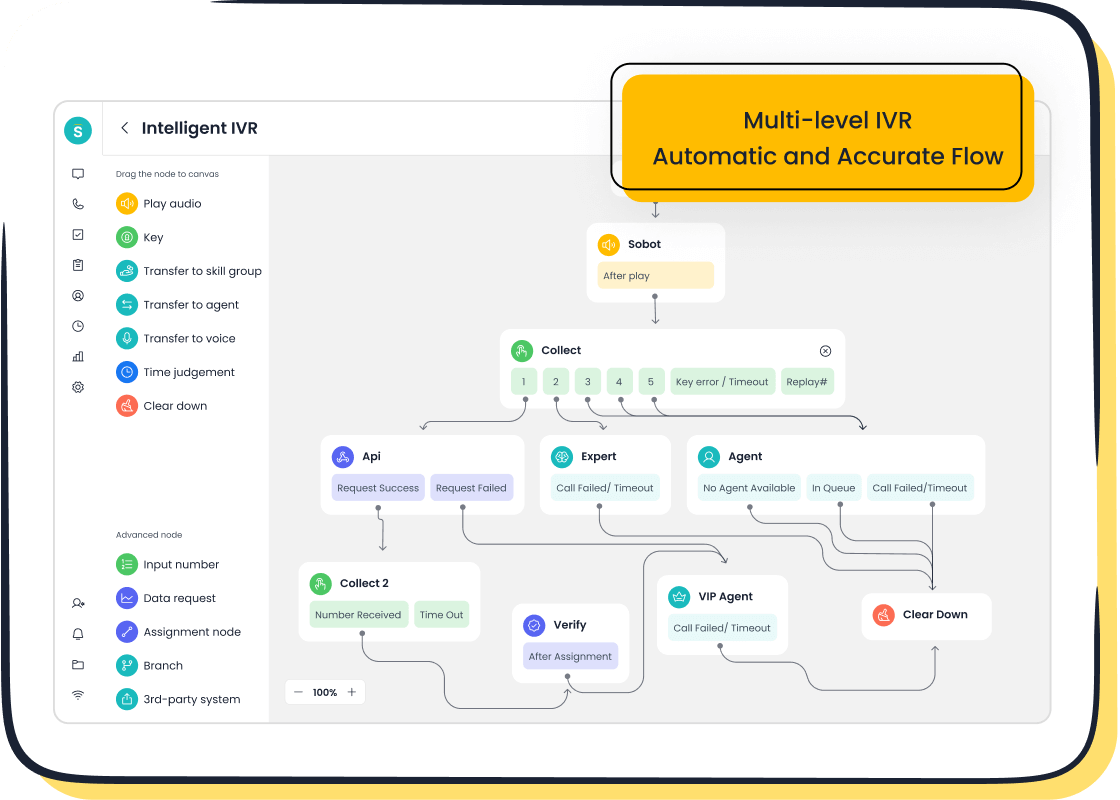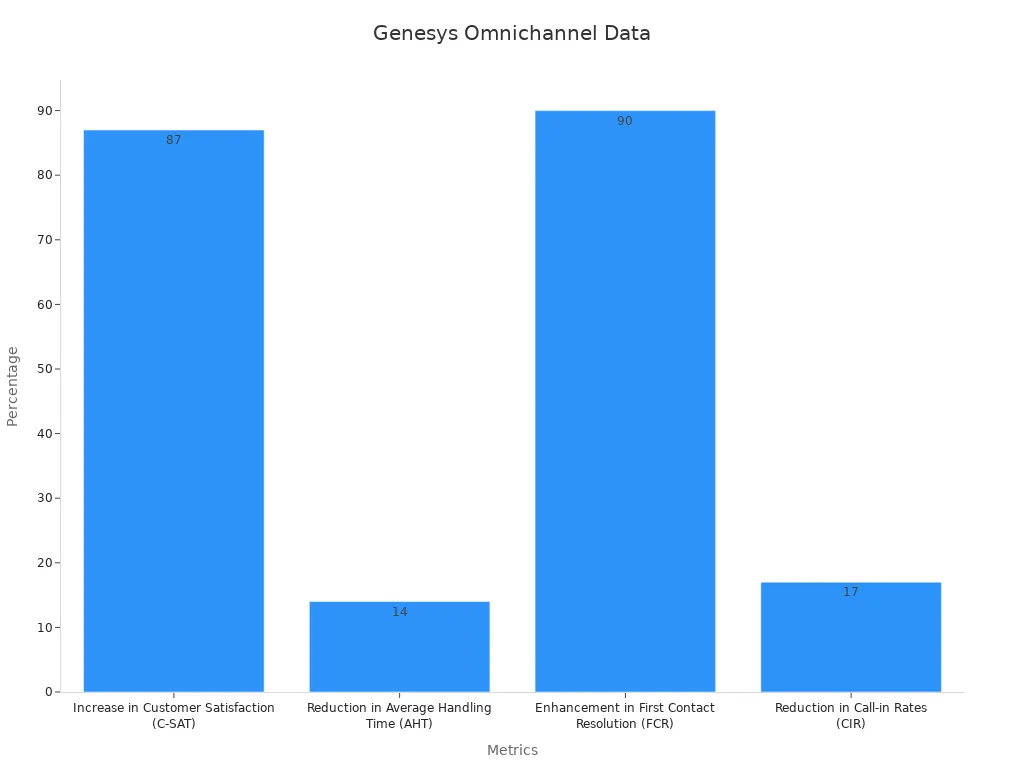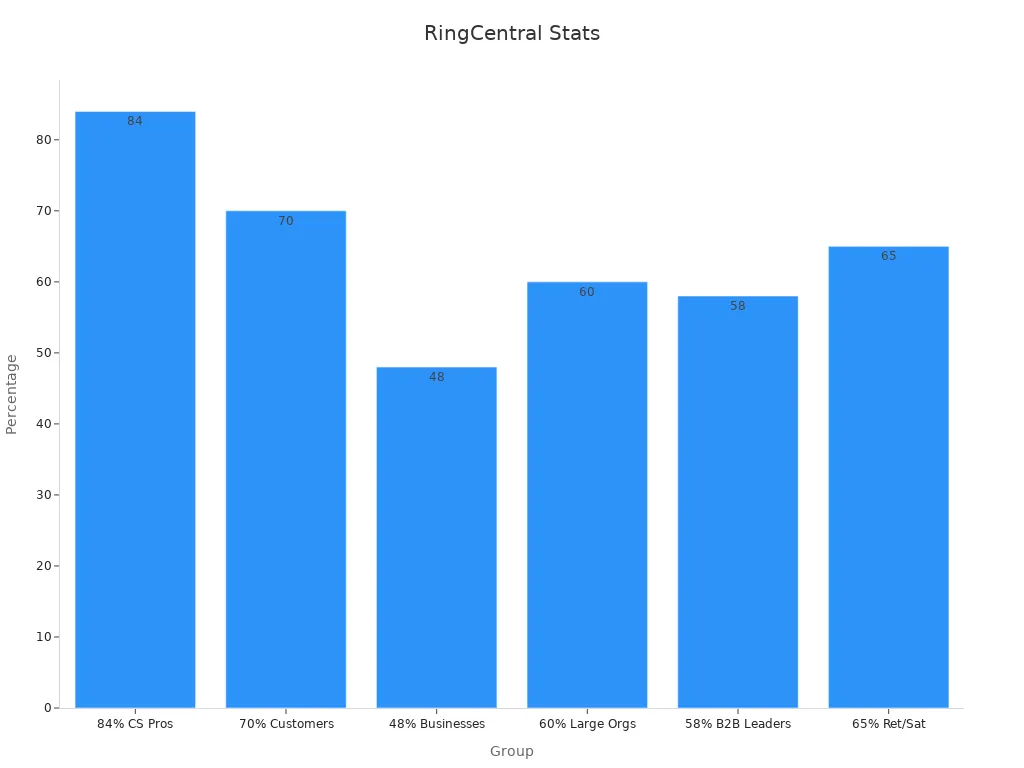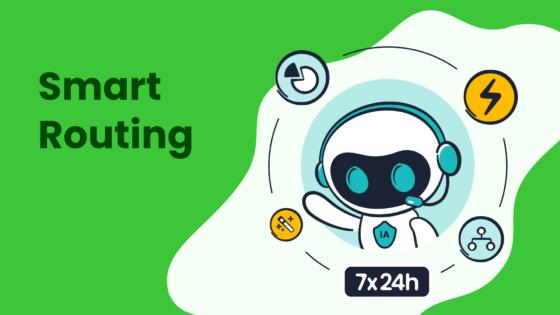Explore the Leading Cloud Call Center Solutions Today

In today’s fast-paced world, businesses rely on cloud call center solutions to deliver exceptional service. These platforms enhance efficiency by streamlining communication processes. They also scale effortlessly, accommodating growing customer demands. With 55% of companies moving contact center capabilities to the cloud, it’s clear that this shift is transforming customer experiences. Additionally, 70% of contact centers are adopting AI to improve service quality. Solutions like Sobot’s AI-powered cloud contact center combine advanced technology and user-friendly features, helping businesses achieve higher customer satisfaction while staying ahead in a competitive market.
What Are Cloud Call Center Solutions?
Definition and Overview
A cloud call center solution is a modern communication platform that operates over the internet. It manages all inbound and outbound customer interactions for businesses. Unlike traditional systems, cloud-based contact centers eliminate the need for physical hardware. They provide a centralized hub for handling calls, emails, and messages, ensuring seamless communication. Major players in this space include Genesys, RingCentral, and Five9, offering advanced tools to enhance customer experience. These platforms are designed to adapt to your business needs, making them a flexible and scalable choice for companies of all sizes.
| Section | Description |
|---|---|
| Market Definition | A cloud-based contact center is an internet-based facility for communication. |
| Key Players | Companies like Avaya, Genesys, and RingCentral lead the market. |
| Market Dynamics | Insights include growth trends, segmentation, and competitive strategies. |
Key Benefits Over Traditional Call Centers
Cloud call centers offer several advantages over traditional setups. They require minimal upfront investment, as there’s no need for expensive hardware. These solutions are scalable, allowing you to adjust the number of agents based on demand. AI-based capabilities enable 24/7 operations without additional staffing costs. Additionally, cloud platforms support remote work, reducing overhead expenses like office space. AI-powered cloud contact centers also improve efficiency, processing up to 40% more calls without increasing staff. This leads to higher profitability and better customer satisfaction.
- Cost Efficiency: Lower initial costs and reduced operational expenses.
- Scalability: Easily expand or reduce capacity as needed.
- Remote Work Support: Agents can work from anywhere, increasing flexibility.
- AI Integration: Automates repetitive tasks, saving time and resources.
Common Features of Cloud Call Center Platforms
Cloud contact center software comes packed with features to streamline operations. Intelligent IVR systems allow you to route calls efficiently. Omnichannel support ensures customers can reach you through their preferred channels, such as phone, email, or chat. Real-time monitoring tools help supervisors track performance and make data-driven decisions. AI-based capabilities like sentiment analysis and speech analytics enhance service quality. These platforms also offer high system uptime, ensuring reliability.
- AI Capabilities: Sentiment analysis and speech analytics for better insights.
- Omnichannel Support: Unified communication across multiple channels.
- Real-Time Monitoring: Track agent performance and optimize workflows.
- Global Reach: Support for remote teams and international customers.
- Rapid Deployment: Quick setup without extensive IT support.
By adopting a cloud-based contact center, you can improve customer satisfaction and streamline your operations. These solutions are designed to meet the demands of modern businesses, ensuring a seamless experience for both agents and customers.
Top Cloud Call Center Solutions in 2025

Amazon Connect: Scalability and AI Integration
Amazon Connect stands out as a cloud-based contact center designed for businesses seeking scalability and advanced AI integration. You can set it up quickly without extensive IT support, making it an ideal choice for companies of all sizes. The platform dynamically adjusts capacity to meet fluctuating customer demands, ensuring consistent service levels.
Amazon Connect leverages AI-driven automation to enhance agent productivity. It uses Amazon Lex for conversational AI, enabling natural and intelligent customer interactions. Skills-based routing ensures that calls are directed to the most qualified agents, improving resolution rates. Additionally, real-time analytics provide actionable insights, helping you optimize operations and improve customer satisfaction.
According to Cresta’s predictions, AI-driven solutions like Amazon Connect can reduce average handle time by up to 25% and increase customer satisfaction by 20%.
Key features of Amazon Connect include:
- AI-powered automation for handling routine tasks.
- Skills-based routing to connect customers with the right agents.
- Real-time analytics for performance monitoring.
- Scalability to adjust agent capacity as needed.
By adopting Amazon Connect, you can streamline your operations and deliver a superior customer experience.
Genesys Cloud CX: Omnichannel Excellence
Genesys Cloud CX excels in providing seamless omnichannel communication, making it a top choice for businesses aiming to enhance customer interactions. This platform integrates various channels, including voice, email, chat, and social media, into a unified interface. You can track and analyze customer interactions across all touchpoints, ensuring a consistent and personalized experience.
The platform’s AI-based capabilities improve efficiency by automating repetitive tasks. It also enhances first-contact resolution rates, reducing the need for follow-up interactions. Genesys Cloud CX offers robust analytics tools, enabling you to monitor performance and make data-driven decisions.
| Metric | Result |
|---|---|
| Increase in Customer Satisfaction (C-SAT) | 87% |
| Reduction in Average Handling Time (AHT) | 14% |
| Enhancement in First Contact Resolution (FCR) | 90% |
| Reduction in Call-in Rates (CIR) | 17% |
These impressive metrics highlight the platform’s ability to improve operational efficiency and customer satisfaction. With Genesys Cloud CX, you can provide a seamless and engaging customer experience across all channels.

Sobot Voice/Call Center: Intelligent and Unified Communication
Sobot Voice/Call Center offers a comprehensive solution for businesses looking to enhance their communication capabilities. This cloud-based contact center combines advanced AI-powered features with a user-friendly interface, making it a reliable choice for businesses of all sizes.
The platform’s intelligent IVR system allows you to customize greetings, build menus, and route calls efficiently. Its unified workspace consolidates customer data, enabling agents to provide personalized service. Real-time monitoring and analytics help you track performance and identify areas for improvement. Additionally, Sobot’s AI-powered Voicebot handles routine inquiries, freeing agents to focus on complex issues.
Key features of Sobot Voice/Call Center include:
- Intelligent IVR for efficient call routing.
- Unified workspace for managing customer interactions.
- AI-powered Voicebot for handling repetitive tasks.
- Global number availability for international communication.
- 99.99% uptime for reliable operations.
Sobot’s solution is trusted by leading brands like Samsung, OPPO, and Philips. For example, Samsung achieved a 97% customer satisfaction rate and a 30% increase in agent efficiency after implementing Sobot’s platform. By choosing Sobot Voice/Call Center, you can improve operational efficiency and deliver exceptional customer service.

RingCentral: Comprehensive Communication Platform
RingCentral offers a robust cloud call center solution that simplifies communication across multiple channels. Its omnichannel capabilities allow you to route customer queries through emails, SMS, social media, voicemail, and live chats. This ensures customers can reach your business using their preferred method, enhancing their experience. With detailed analytics, including speech, text, and predictive insights, you gain real-time data to optimize operations and improve customer satisfaction.
RingCentral integrates seamlessly with over 300 business applications, streamlining workflows and boosting productivity. Whether you use Salesforce, Slack, or HubSpot, RingCentral ensures your tools work together efficiently. This integration reduces manual tasks, allowing your team to focus on delivering exceptional service.
📊 Did you know?
84% of customer service professionals believe a unified view of customer information is essential for providing a great experience. Additionally, 70% of customers think one phone call should be enough to resolve their issues.
| Statistic | Description |
|---|---|
| 84% of customer service professionals | Say a 'unified view' of customer information is key to providing a great experience. |
| 70% of customers | Believe that a single phone call should be enough to get in touch with a company. |
| 48% of businesses | Are tracking the financial ROI of customer experience improvement projects. |
| 65% | Consider retention rate and satisfaction as the most important metrics for customer experience. |
RingCentral’s platform empowers you to map out customer journeys, track retention rates, and measure satisfaction levels. These features make it an ideal choice for businesses aiming to build a comprehensive communication hub.

CloudTalk: CRM Integration and Workforce Optimization
CloudTalk stands out among call center solutions for its advanced CRM integration and workforce optimization features. It enables you to build automated workflows for calling and SMS, ensuring seamless communication with customers. With tools like automated call distribution, calls are routed to the right agents based on priority, improving efficiency and resolution rates.
The platform’s AI-powered features, such as sentiment analysis and call transcription, provide valuable insights into customer interactions. Sentiment analysis helps you detect customer emotions, allowing agents to tailor their responses effectively. Call transcription eliminates manual note-taking, saving time and enhancing productivity.
| Feature | Description |
|---|---|
| CRM Integration | Build automated calling and SMS workflows with CRM integrations |
| Automated Call Distribution | Automatically receive and distribute calls to the right agents |
| Call Disposition | Seamlessly group and track conversations by outcomes |
| SMS Bots | Send automated answers, follow-ups, and responses |
| Predictive Dialer | Enhance contact rates with dialing automation software |
| AI Coaching | Ramp up and train agents rapidly with personalized coaching plans |
| Agent Assist | Boost agents' success rate with real-time AI-powered guidance |
| Call Transcription | Ditch manual note-taking with AI-based summary & transcriptions |
| Sentiment Analysis | Track and detect customer sentiment |
CloudTalk integrates with popular tools like HubSpot, Salesforce, and Slack, enabling seamless workflow automation. Its predictive dialer enhances contact rates, while AI coaching provides personalized training pathways for agents. These features ensure your team is equipped to handle customer inquiries efficiently, improving satisfaction and retention rates.
By adopting CloudTalk, you can optimize your workforce, automate repetitive tasks, and deliver personalized service. This ai-powered cloud contact center is designed to meet the needs of modern businesses, ensuring a seamless experience for both agents and customers.
Comparative Analysis of Leading Solutions
Key Differences in Features
When comparing cloud call center solutions, you’ll notice distinct differences in their features. These differences often determine how well a platform aligns with your business needs. Here’s a breakdown of key features across leading solutions:
| Feature | Description |
|---|---|
| Call Routing Options | Skills and availability-based routing with conversational AI for automating inquiries. |
| Built-in Analytics | Metrics on caller activity and agent performance, including heat maps for call volume patterns. |
| Workforce Management | Automation of agent forecasting and scheduling to improve quality and efficiency. |
| Customizability | Open API for custom integrations and multi-channel routing capabilities. |
| Cloud Architecture | Flexibility and agility of cloud solutions compared to traditional on-prem systems. |
| AI Integration | Integration of AI features to enhance customer interactions and operational efficiency. |
| Cost-effectiveness | Evaluation of pricing models in relation to features offered. |
| Scalability | Ability to scale operations based on business needs. |
| Customer Support | Quality and availability of support services provided by the vendor. |
| Integration Capabilities | Compatibility with other tools and systems for seamless operations. |
These features highlight the versatility of cloud contact center software, making it easier for businesses to choose a solution that fits their unique requirements.
Pricing Tiers and Affordability
Pricing for cloud call center solutions varies based on the features included. Basic plans are affordable, while advanced options cater to businesses with specific needs. Here’s an overview:
- Basic plans typically start at $15 to $30 per user per month, offering standard features like call routing and analytics.
- Advanced plans with AI-powered analytics and predictive dialing range from $100 to $150 per user per month.
- Some providers offer all-inclusive packages with volume discounts, making them cost-effective for larger teams.
- On average, pricing can exceed $200 per user monthly when additional features are added.
Understanding these pricing tiers helps you evaluate affordability while ensuring the solution meets your operational needs.
Standout Features for Specific Business Needs
Different businesses require tailored solutions to address their unique challenges. Here are standout features that cater to specific needs:
| Feature | Benefit |
|---|---|
| Unified reporting | Provides a comprehensive view of data and metrics for performance assessment and strategy. |
| Customized reports | Facilitates in-depth analysis tailored to different organizational levels. |
| Quality management | Monitors agent performance to ensure service standards and identify training needs. |
| Performance benchmarking | Ensures consistent quality assurance across operations. |
| Targeted coaching | Enhances skill development and overall service quality. |
For example, businesses focused on first contact resolution benefit from AI-driven analytics and multi-channel support. These features streamline operations and improve customer satisfaction. Predictive analytics also play a crucial role in optimizing workflows and enhancing decision-making.
How to Choose the Right Cloud Call Center Solution
Assessing Your Business Needs
Choosing the right cloud call center solution starts with understanding your business requirements. You need to identify the specific goals your contact center aims to achieve. These could include improving customer satisfaction, increasing first contact resolution rates, or optimizing agent performance. Establishing clear metrics aligned with your objectives ensures the solution you select meets your expectations.
To begin, evaluate your current infrastructure. Assess whether your hardware and network can support cloud-based services. Next, review your applications to determine which ones are suitable for migration. Consider dependencies that might affect the transition. Finally, analyze your data needs. This includes storage requirements, security protocols, and compliance with industry regulations.
Here’s a checklist to guide your assessment:
- Define key performance indicators (KPIs) like customer satisfaction and agent productivity.
- Customize quality assurance processes to align with your business goals.
- Conduct a cloud readiness assessment to identify strengths and weaknesses in your IT environment.
Tip: Involve stakeholders early in the process. Their input ensures the solution aligns with operational needs and gains organizational support.
Evaluating Scalability and Integration Options
Scalability and integration are critical factors when selecting a cloud call center platform. A scalable solution allows you to adjust resources based on demand fluctuations. For example, during peak seasons, you can add more agents without overhauling your system. Similarly, integration capabilities ensure seamless operations by connecting the platform with your existing tools, such as CRM systems or workforce management software.
Cloud-based solutions simplify scalability. Providers handle maintenance and updates, freeing your internal teams to focus on core tasks. Additionally, the pay-as-you-go model ensures cost efficiency. You only pay for the resources you use, making it easier to manage budgets.
When evaluating scalability and integration, consider the following:
- Compare how different platforms handle auto-scaling policies.
- Check if the solution supports third-party app integration for enhanced flexibility.
- Ensure the platform can accommodate global operations, including multi-language and multi-currency support.
Note: A provider with a strong track record in scalability and integration can help you future-proof your operations.
Considering Cost and ROI
Cost and return on investment (ROI) play a significant role in your decision-making process. While cloud call center solutions often reduce upfront expenses, you must account for recurring costs like subscription fees and training. Understanding the total cost of ownership helps you evaluate the financial impact of your choice.
Here’s a breakdown of potential costs:
| Costs | Description | Details |
|---|---|---|
| Implementation and Integration | Setting up the platform and connecting it with existing systems. | Includes setup fees, hardware, software licenses, and high-speed internet. |
| Training and Onboarding | Preparing agents and staff to use the new system. | Covers in-person training and online courses. |
| Migration | Transferring data from legacy systems. | Includes data extraction and loading. |
| Subscription Fees | Recurring costs for using the platform. | Includes user licenses, minutes, and messages. |
| Scalability | Expenses for scaling up operations. | Adding seats or resources as needed. |
| Cost Savings from Automation | Reducing manual tasks through AI-driven features. | Skills-based routing, self-service options, and workflow automation. |
Investing in features like predictive analytics and real-time analytics can enhance agent productivity and improve customer satisfaction. For instance, automation reduces average handle time, allowing agents to focus on complex issues. This not only boosts efficiency but also increases revenue. Studies show that a 10% improvement in customer satisfaction can lead to a 2-3% rise in revenue.
Tip: Calculate ROI by comparing the cost savings from automation and enhanced productivity against the total investment. This ensures you choose a solution that delivers long-term value.
Future Trends in Cloud Call Center Solutions

AI and Automation in Customer Service
AI and automation are transforming customer service in cloud call centers. These technologies streamline operations by handling repetitive tasks, such as answering FAQs or routing calls. This allows agents to focus on complex issues, improving efficiency and customer satisfaction. For example, companies like Thrasio automated 53% of their customer interactions, reducing response times from one hour to under 20 minutes. Similarly, Honeylove increased agent productivity by 54%, leading to fewer escalations.
| Company | Automation Impact | Result |
|---|---|---|
| aXcelerate | Reduced training time for new agents by 50% | Improved operational efficiency |
| Tithely | Cut average handle time by up to 26% | Enhanced customer service |
| Thrasio | Automated 53% of customer interactions | Reduced first response times from 1 hour to under 20 minutes, improved CSAT from 87% to 97% |
| Honeylove | Increased agent productivity by 54% | Reduced escalations by 20% |
| Tithely | Reduced chat handle times by 26% | Achieved a 205% increase in solved cases |
AI also enables features like sentiment analysis, which helps agents understand customer emotions and respond appropriately. By adopting AI-driven solutions, you can enhance service quality and build stronger customer relationships.
Omnichannel Support and Integration
Omnichannel support is becoming essential for modern businesses. It allows customers to interact with your brand through their preferred channels, such as email, chat, or social media, while ensuring a seamless experience. Research shows that companies with strong omnichannel engagement retain 89% of their customers. Additionally, organizations using omnichannel contact centers report a 23% increase in agent productivity.
Real-time analytics further enhance omnichannel support by providing insights into customer interactions. These insights help you optimize strategies and allocate resources effectively. With omnichannel integration, you can unify communication channels, improve agent efficiency, and deliver consistent service across platforms.
Enhanced Data Security and Compliance
As cloud call centers handle sensitive customer data, ensuring data privacy and compliance has become a top priority. Providers implement robust security measures, such as encryption protocols and multi-factor authentication, to protect customer data privacy. They also adhere to regulations like PCI, HIPAA, and GDPR to avoid legal issues and penalties.
| Feature | Description |
|---|---|
| Security Measures | Implementation of encryption protocols, access controls, and regular security audits. |
| Compliance Standards | Adherence to regulations such as PCI, HIPAA, and GDPR to avoid legal issues and penalties. |
| Risk Mitigation | Use of multi-factor authentication and regular security assessments to prevent data breaches. |
| Provider Certifications | Verification of certifications like ISO-27001 and PCI DSS to ensure security proficiency. |
| Infrastructure Audits | Conducting audits to ensure alignment with security policies and identify vulnerabilities. |
| Privacy Protection | Regular third-party security audits to validate the provider's security measures. |
By prioritizing data security, you can build trust with your customers and ensure compliance with industry standards. This not only protects your business but also enhances customer loyalty.
Selecting the right cloud call center solution is essential for modernizing your customer service operations. These solutions leverage advanced technology, such as AI-driven tools, to enhance efficiency and satisfaction. Features like real-time monitoring and automation allow you to identify trends and improve performance quickly. Businesses using these platforms often achieve higher first call resolution rates and reduced response times, leading to better customer experiences.
Explore the top solutions discussed, including Sobot’s intelligent and unified platform, to find the one that aligns with your needs. By adopting a cloud-based system, you can streamline operations, personalize engagements, and deliver exceptional service.
FAQ
What is cloud call center software?
Cloud call center software is a platform that manages customer interactions over the internet. It eliminates the need for physical hardware and provides tools for handling calls, emails, and messages. This software improves efficiency, scalability, and customer engagement, making it essential for modern businesses.
How does conversational AI enhance call center operations?
Conversational AI automates repetitive tasks like answering FAQs and routing calls. It uses natural language processing to understand customer queries and provide accurate responses. This technology improves efficiency, reduces response times, and enhances customer experience management by allowing agents to focus on complex issues.
Can cloud call center software integrate with other customer service tools?
Yes, most cloud call center software integrates seamlessly with customer service tools like CRM systems, ticketing platforms, and chat applications. This integration ensures a unified workspace, streamlines workflows, and enhances customer engagement by providing agents with all necessary information in one place.
What industries benefit most from cloud call center software?
Industries like retail, finance, gaming, and education benefit significantly from cloud call center software. These sectors rely on efficient customer service tools to handle high volumes of interactions, improve customer satisfaction, and optimize customer experience management.
Is cloud call center software secure?
Yes, cloud call center software prioritizes security with features like data encryption, multi-factor authentication, and compliance with regulations such as GDPR and HIPAA. These measures protect sensitive customer data and ensure trust in your customer engagement processes.
See Also
Best Cloud Contact Center Services Reviewed for 2024
Leading Contact Center Solutions Evaluated for 2024
Discovering the Best Cloud Contact Centers for 2025
